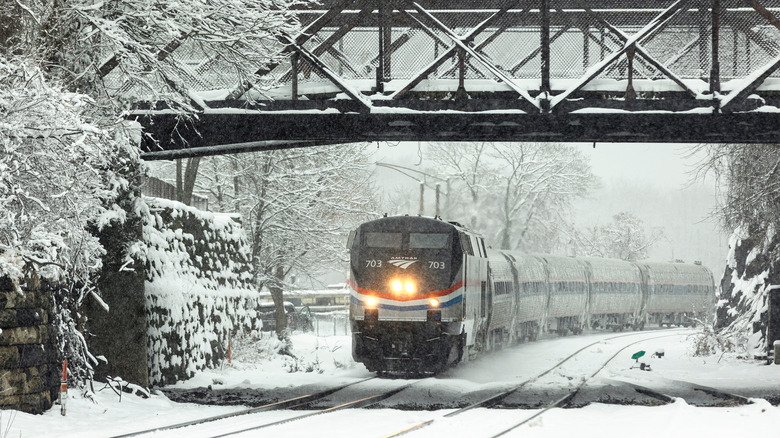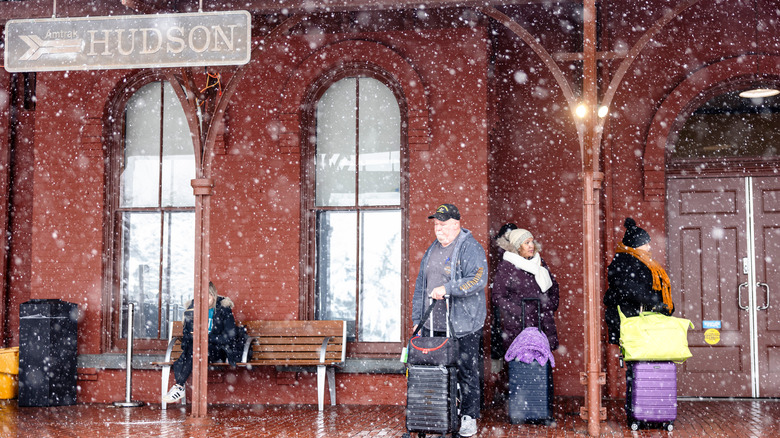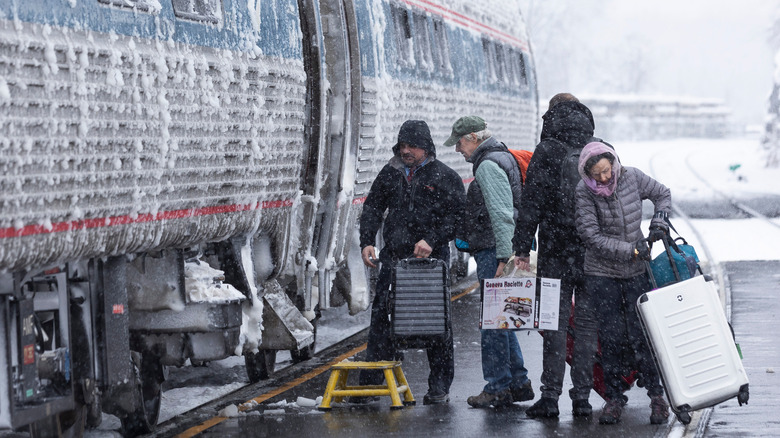Our Expert Shares How Winter Weather Can Derail Your Train Trip (And How To Prep For It)
There's something undeniably romantic and fantastical about train rides in the wintertime. It's as if everything could freeze frame into a snowy landscape painting as you glide along the rails. However, for those opting for winter train travel, it can also introduce a slew of dangers and challenges that are often underestimated. Marc Magliari, Senior Public Relations Manager for Amtrak Government Affairs & Corporate Communications, sheds light on the risks associated with winter train travel and offers some invaluable advice for those preparing to journey during the colder months.
According to Magliari, winter weather can significantly affect train operations, especially in regions prone to extreme cold or blizzard conditions. In the U.S., if conditions become severely cold and hit temperatures of below zero, he explains that "track owners might ask us to suspend operations for safety reasons." While this is not a common issue in the Northeast, Amtrak might reduce the number of train operations, for example, in sections such as the Boston-Washington corridor, due to diminished demand or directives from local governments during severe weather events.
The primary risks for train passengers during winter include delays and, in some instances, cancellations, states Magliari. These disruptions can be caused by various factors, including hazardous track conditions, reduced visibility, and the need for additional maintenance and safety checks. The unpredictability of winter weather can also lead to sudden changes in travel plans, leaving passengers stranded or delayed for extended periods. Indeed, winter weather predictions may affect your travel, no matter the method of transportation.
Travel risks for passengers
When discussing the types of weather that pose the most significant hazards for train travel, Magliari highlights severe cold and high heat conditions. Severe colds can lead state and local government leaders to declare weather emergencies, advising against travel altogether. Extreme heat, on the other hand, causes rail, bridge, and catenary wires to expand, which necessitates speed reductions across train operations. These kinds of extreme weather conditions can jeopardize the safety of passengers and crew, making it crucial for Amtrak to adjust quickly.
"We take our cues from those official [government] sources and private meteorology firms we have under contract," says Magliari. Thankfully, Amtrak has systems in place for seasons of inclement weather. Amtrak ensures its trains continue to operate during snowy winters by closely monitoring weather, assessing railroad conditions, performing proactive tree-trimming (as downed trees can block tracks and damage electrical systems), deploying additional staff, and conducting switch inspections.
However, with train travel, "danger" doesn't always mean "life-threatening" — it could also mean "life-disrupting" for those on the wrong side of luck. What if the train gets delayed, canceled, or the passenger can no longer make it? According to Amtrak's Customer Service Commitments, in the case of delays or cancelations, the ticket holder will be notified and then rebooked or compensated for the trip. If the train gets unexpectedly disrupted mid-service, passengers will be provided with complimentary food and beverage services. If a passenger has a change of plans, they can obtain a refund for eligible tickets.
Preparing for winter train travel
To mitigate some of these risks and ensure a safer, smoother experience, Magliari offers several tips for passengers planning train travel during the winter months. The main tip is to factor in extra time. Magliari explains that winter conditions can affect not just the train operation itself but also local transportation to and from the train station. Allocating buffer time for your travel itinerary to accommodate potential delays is essential.
Before departing, Magliari suggests you confirm in advance that any events you plan to attend have not been postponed or canceled. Imagine going through a grueling multi-hour journey only to arrive and find out that the very thing you traveled for is no longer happening! Moreover, ensure that your pickup arrangements at your destination are still in place and capable of operating in winter conditions. Magliari advises passengers to prepare for the destination's weather by bringing suitable clothing and packing for cold weather or, in the worst-case scenario, planning to purchase the necessary items upon arrival.
Staying updated about the status of your train trip before venturing out is crucial, reminds Magliari. Luckily, Amtrak provides updates on service, trip, and train status through various channels, including desktop and mobile versions of their website, Amtrak iOS and Android apps, and their customer service hotline 800-USA-RAIL. One final recommendation from Marc Magliari is to ultimately keep yourself organized by booking train tickets through these platforms, as they allow customers to directly receive notifications about their trips.


